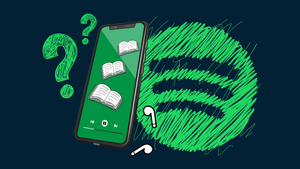The US Federal Trade Commission has been formally asked to investigate Spotify’s decision, in 2023, to automatically opt its millions of premium subscribers into a new product that bundled audiobooks with music and podcasts.
While the addition of audiobooks initially looked like a freebie, the extra content ultimately increased the cost of a subscription while also - in the US - reducing how much money flows to songwriters and music publishers.
Senators Marsha Blackburn and Ben Ray Luján say in a letter to FTC Chair Andrew Ferguson that they have “serious concerns” about Spotify’s bundling tricks.
“These actions harm consumers and could deeply damage the marketplace and the music royalty system”, they write. To that end, they urge the FTC “to investigate the impact of Spotify’s actions”, and to take steps to both “protect Americans from being forced into subscriptions without notice or choice” and “safeguard the music marketplace”.
The bundling of audiobooks into the main Spotify premium product impacts on the music industry in the US because of the compulsory licence that dictates what streaming services have to pay to writers and publishers whose songs they stream.
That licence provides a discount on bundle products which means, by reclassifying its premium product as a music + audiobooks bundle, Spotify reduces what it has to pay to writers and publishers, ultimately resulting in “songwriters losing billions of dollars”.
That’s according to David Israelite of the US National Music Publishers Association, who has welcomed the Senators’ letter, adding, “44 million US Spotify customers were forcibly converted to a ‘bundled’ plan they didn’t ask for or choose - Spotify’s customers deserve better”.
Although a lot of attention has been given to the impact of Spotify’s bundling tricks on writers and publishers, it’s also true that the bundling impacts on consumers, and not just in the US.
Which arguably strengthens the call for the FTC to investigate - and could result in competition and consumer rights regulators in other countries taking an interest, even though the negative impact on writers and publishers is specific to the US market.
It impacts on consumers because, in at least some markets, Spotify basically opted all of its premium subscribers into a more expensive subscription package with audiobooks without explicit consent.
Fifteen hours of audiobooks access was initially added to Spotify Premium for free, but then the cost of a subscription was subsequently increased by a dollar or pound a month. While at first that appeared to be another inflationary price increase - similar to the price increases Spotify instigated in 2023 - it was, in fact, directly linked to the inclusion of audiobooks.
We know this because, in multiple countries, Spotify offered existing subscribers the option to avoid the price increase by removing audiobooks from their subscription, by actively switching their accounts to what is called the Basic Plan. However, awareness of that option was generally pretty low and it isn’t offered to new subscribers.
As Blackburn and Luján explain in their letter, the Basic Plan “is only available to certain existing subscribers - not new subscribers”, and “Spotify has hidden the Basic Plan so that existing subscribers must jump through endless hoops to find the option”. As a result, “only a handful of Spotify’s millions of Premium Plan subscribers switched back to a music-only ‘Basic’ plan”.
In the US, there’s also another impact on consumers, because - as well as the Basic Plan - Spotify has an audiobooks-only subscription for $9.99 a month. However, critics argue, that product was only launched in order to ensure Spotify would qualify for the bundling discount on what it pays writers and publishers.
For the discount to apply, the non-music content that is bundled with the main premium subscription product has to have “more than token value”. Spotify uses the $9.99 product to insist audiobook access has considerable value. Therefore, it’s argued, the $9.99 product only exists for licensing reasons and is deliberately over-priced as a result. Which is bad for any consumers who unknowingly sign up to it.
“Spotify’s audiobooks service is set at an artificially high price for the purpose of gaming federal regulations and deeply cutting music royalty payments”, Blackburn and Luján's letter continues. And the theory that that product only exists to game the system is confirmed by the fact it’s “not offered outside of the US, as there is no similar ability overseas for Spotify to lower royalty rates through content bundling”.
“As the largest music streaming service in the United States”, the two Senators conclude, “Spotify has achieved market dominance in the American music streaming economy and their actions will have lasting repercussions on the creative community and consumers across the country”.
Therefore, “we urge the FTC to investigate this matter and we look forward to working with you on these important issues facing Americans”.

